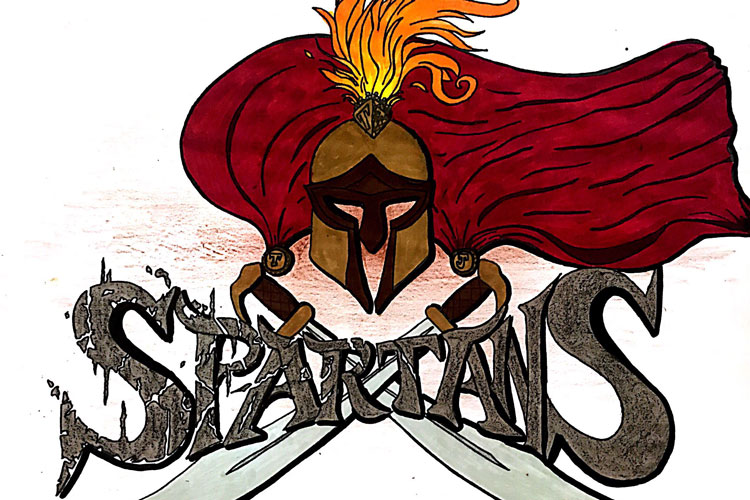
Thomas Jefferson’s Classical League emblem, designed by senior Zaisy Nagel.
Omnes Graecorum quid est verum et iustam sciunt, sed Spartani solum id factitant!
“All the Greeks know what is right and fair, but the Spartans alone practice it!” –TJ Classical League
A few years ago, a couple of students went to Brian Weaver, the Gifted and Talented (GT) itinerant teacher, asking for an additional world language class here at TJ, a Latin course. “Since Weaver had a hard time figuring out how to get a Latin teacher here, I said that I would volunteer to teach it as an after-school club to those who are interested,” announced English teacher Amber Wilson. Wilson studied the language in all four years of high school, and on top of that, she took a year’s worth of graduate coursework in a classical master’s degree in Latin during her time in college. At the time, Wilson wanted to become a lawyer, and since there is a lot of Latin involved in legal work, she thought that learning that language would have helped her prepare. “Besides,” Wilson added, “I’ve always loved mythology, so taking a class where I got to study a passion of mine seemed like a win.”
Latin was the ancient language of Rome, and since the Roman empire had a vast expanse and influential reach, Latin became the dominant language of the entire European era. Studying this relic can help develop confidence in writing and speaking, as Latin is the mother tongue for other modern dialects such as French, Italian, Spanish, Portuguese, and Romanian. “Sixty percent of English words can trace their roots back to Latin,” explained junior member Braedy Guenther. Word choice, vocabulary, and grammar improve by merely understanding the ancestry of one’s vernacular language. Wilson teaches the different ways Latin terms inflect, which is where the ending of words change to produce a different meaning. The words could be placed in any order and still make sense. Wilson explained that this helps her students to better understand how sentences work by depicting the translation to English in a non-native way, much like a puzzle. TJ students in the Classical League, aka Latin Club, compete in the Colorado Junior Classical League (COJCL), an organization dedicated to the study of classics in modern times to keep them alive. In addition to the trip up to Estes Park for COJCL, the Latin club and its members will be traveling to Italy and Greece over spring break to approach learning the language differently. By experiencing the places of Latin’s origins, students can ‘live’ in it by being immersed in the remnants of its culture.
Junior club member Kassidy Pressley believes that “[Latin] is very important because it’s a part of history and it’s where we come from.” Not only does Latin advance academic standards, but it can also take learners on an adventure into the past. By visiting the origins of the language and studying the ancient society that is hugely influential in today’s world, it can reveal a lot about humanity. The history behind the language allows for civil debate and civil discourse since it was the birthplace of representative democracy. Wilson testifies to the importance of the political ideas that come from the era because it lays down a foundation for our society today. Latin artifacts also permit people from the modern age to study medieval text that can reveal a new perspective on the human condition throughout time. Philosophical ideals such as what it means to be ancient or the origin of humanity can be derived from the complexity of this timeworn language and the society it once was.
Latin club has much to provide. In addition to its academic and cultural importance, the club is also filled with a sense of community and friendly banter.
“My favorite Latin quote is from Julius Caesar, who said ‘Veni, Vidi, Vici,’ which means, ‘I came, I saw, I conquered,’” explained senior club President Claire Luhman, remarking upon what she has learned.
“He said it after he crossed to Rubicon,” adds Guenther.
“And why did he cross the Rubicon?” asks Wilson, “To get to the other side!”
Any students interested in joining the club along its many adventures into the ancient language are welcome to attend the weekly meetings from 3:00-4:00 p.m. in room 219. The club promotes a creatively engaging atmosphere surrounded by people who have a passion for learning.